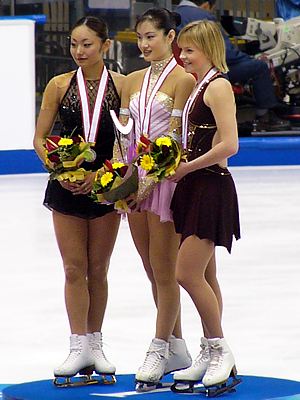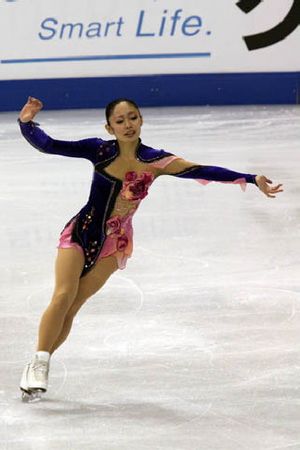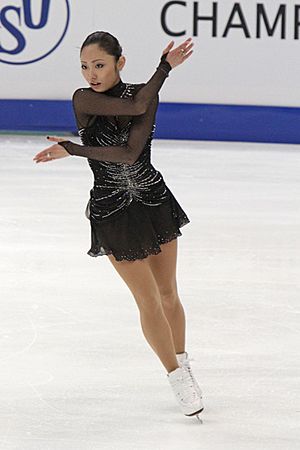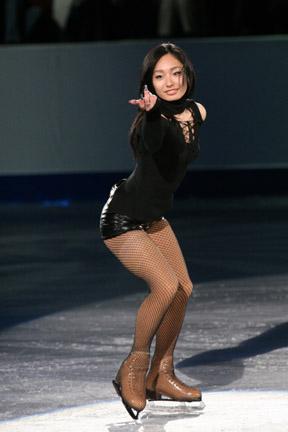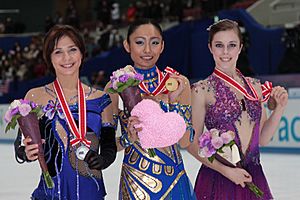Miki Ando facts for kids
Quick facts for kids Miki Ando |
|
|---|---|
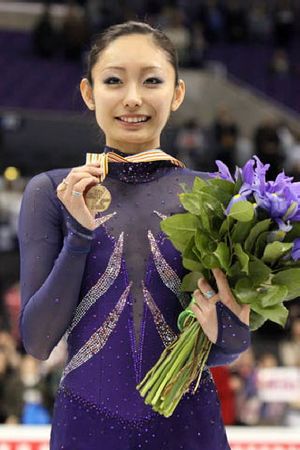
Ando at the 2009 World Championships
|
|
| Personal information | |
| Country represented | |
| Born | December 18, 1987 Nagoya, Aichi Prefecture, Japan |
| Height | 1.62 m (5 ft 4 in) |
| Began skating | 1995 |
| Retired | 2013 |
| Miki Ando | |
|---|---|
| Japanese name | |
| Kanji | 安藤 美姫 |
| Kana | あんどう みき |
Miki Ando (安藤 美姫, Andō Miki) is a Japanese figure skater who is now retired. She was born on December 18, 1987. Miki Ando won the World Figure Skating Championships twice, in 2007 and 2011. She also became the Four Continents champion in 2011.
Before that, she was the World Junior champion in 2004. Miki Ando also won the Japanese national championship three times (2003, 2004, and 2010). She made history as the first female skater to successfully land a quadruple jump in a competition. This happened at the 2002–03 Junior Grand Prix Final in the Netherlands.
Contents
- About Miki Ando's Life
- Miki Ando's Skating Journey
- Starting Her Skating Career
- First Full Senior Season (2004–05)
- Preparing for the Olympics (2005–06)
- New Coach, World Champion (2006–07)
- Challenges and Injuries (2007–08)
- Bronze Medal at Worlds (2008–09)
- Olympic Season (2009–10)
- Second World Title (2010–11)
- Taking a Break (2011–12)
- Return and Retirement (2012–14)
- After Competing
- Skating Programs
- Miki Ando's Competition Results
- Detailed Competition Results
- See also
About Miki Ando's Life
Miki Ando was born in Nagoya, Aichi Prefecture, Japan. Her father passed away in a car accident when she was eight years old. In 2006, Ando joined Toyota and also started studying at Chukyo University. She finished her studies there in March 2011. While training in the U.S., she learned English. In January 2013, she left Toyota Motor.
Miki Ando became a mother in April 2013. She gave birth to a daughter named Himawari, which means "sunflower" in Japanese.
Miki Ando's Skating Journey
Starting Her Skating Career
Miki Ando began skating in 1996 when she was eight years old. Her first coach was Rina Horie. Soon after, Yuko Monna started coaching her. Yuko Monna also coached other famous skaters like Mao Asada. From the 2000–01 season, Nobuo Satō became her coach. Her skating routine already included a difficult 3Lz-3Lo jump combination.
Miki Ando made her international debut as a junior skater. She won both of her 2001–02 ISU Junior Grand Prix (JGP) events. This allowed her to qualify for the JGP Final, where she also won a gold medal. In Japan, she became the Japanese junior champion. She also won a bronze medal at the senior national championships. She finished her season by winning a bronze medal at the 2002 World Junior Championships.
Ando won both of her 2002–03 JGP events. At the JGP Final, she made history. She was the first female skater to land a quadruple jump in a competition. She performed a quadruple Salchow jump and won the bronze medal. She was the only woman to do this until January 2018. That's when junior skater Alexandra Trusova also landed the same jump in a competition. That season, Miki Ando won her national Junior title again. She also took home a silver medal at the World Junior Championships.
Miki Ando had a great year in 2003–04. She won all her junior competitions. This included the Junior Grand Prix Final. She also won her third junior national title in a row and the Junior Worlds. She also won the Japan Championships (senior level). She placed 4th at her first senior World Championships.
First Full Senior Season (2004–05)
The 2004–05 season was Miki Ando's first full year as a senior skater. She won two medals in the ISU Grand Prix of Figure Skating series. This helped her qualify for the Grand Prix Final, where she finished fourth. She won her second national senior title. She then placed sixth at the 2005 Worlds.
Preparing for the Olympics (2005–06)
Miki Ando moved to the United States to train with Carol Heiss Jenkins. This was to get ready for the 2005–06 season. This season included the 2006 Winter Olympics in Torino. The season started well for her. She won the silver medal at the 2005 Cup of Russia. However, she finished 4th at the 2005 NHK Trophy. She barely made it to the Grand Prix Final, where she placed 4th. At Japanese Nationals, she finished 6th.
Miki Ando was chosen for the Japanese Olympic team. At the Olympics, she placed 15th. She fell three times in her free skate, including once on her quad attempt. She was not selected for the World Championships the next month.
New Coach, World Champion (2006–07)
Miki Ando changed coaches again for the 2006–07 season. She began training with her new coach, Nikolai Morozov. Ando won a gold medal at the 2006 Skate America. She also won a silver medal at the 2006 Trophée Eric Bompard. She qualified for the Grand Prix Final, where she placed 5th. It was later shared that Ando and the rest of the Japanese team were sick with stomach flu during the competition.
At the Japanese Nationals, Ando dislocated her shoulder during a spin. But she kept skating and finished second overall, behind Mao Asada.
At the 2007 Worlds, Ando placed second in both the short program and the free skate. She scored a total of 195.09 points. She won the World Championship by less than one point over Asada. Ando achieved new personal best scores in both programs and a new total score. She was named one of Vogue Japan's "Women of the Year for 2007." She also received six other awards.
Challenges and Injuries (2007–08)
Miki Ando's 2007–08 season started with a silver medal at the 2007 Skate America. But she placed fourth at the 2007 NHK Trophy. There, she fell three times in her free skate. She did not qualify for the Grand Prix Final. At the Japan Championships, she won the free skate. This put her in second place overall, again behind Asada.
In February, Ando competed for the first time at Four Continents. She tried a 4S jump but it became a double. She won the bronze medal. At Worlds, Ando was 8th after the short program. She had to stop during her free skate. This was because of a leg muscle strain she had since that morning.
Bronze Medal at Worlds (2008–09)
In the 2008–09 Grand Prix season, Miki Ando placed third at 2008 Skate America. She was behind Yuna Kim and Yukari Nakano. She then placed second, again behind Kim, at the 2008 Cup of China. At the Grand Prix Final, Ando landed an attempted 4S in her free skate. This was the first time since 2004. However, the jump was downgraded because the rotations were not enough. Even though she finished last, Ando said she was happy with her performance. She also said she would keep working on her 4S.
At the Japan Championships, she was in 3rd place after the short program. During the warm-up for the free skate, she bumped into Fumie Suguri. She injured her knee. She placed third and earned one of Japan's three spots at the 2009 World Championships. There, she won the bronze medal. She scored 190.38 points in total. She was fourth in the short program and second in the free program.
Ando also represented Japan in a team competition. This was the 2009 ISU World Team Trophy in Tokyo. She placed 3rd in the short program and 6th in the free skate. She finished 5th overall. Team Japan won the bronze medal.
Olympic Season (2009–10)
The Japan Skating Federation had a rule for choosing Olympic skaters. The highest-ranked Japanese skater at the Grand Prix Final would get a spot. With this in mind, Miki Ando competed at Rostelecom Cup. She placed third in the short program. She then won the free skate to win the whole competition. At the NHK Trophy, she placed second in both parts and first overall. These two wins qualified Ando for the Grand Prix Final.
At this GP Final in Tokyo, Ando placed first in the short program. She was 0.56 points ahead of Yuna Kim. She placed second in the free skate. She was awarded the silver medal, behind Kim but ahead of Akiko Suzuki. With this result, she earned a spot on Japan's Olympic team. This was despite placing fourth at the Japanese Championships.
In February 2010, Ando competed at the 2010 Winter Olympics in Vancouver, Canada. In the short program, she did a 3Lz-3L combination. However, the 3L was downgraded. She earned good levels on her spins. She was ranked fourth in the short program and sixth in the free skate. She finished fifth overall. She had planned to skip the 2010–11 season, but she changed her mind after the Olympics.
At the 2010 World Championships, she finished fourth overall. She was eleventh in the short program after falling on her opening 3Lz. She was third in the free skate.
Second World Title (2010–11)
Miki Ando was assigned to the 2010 Cup of China and the 2010 Rostelecom Cup for the 2010–11 Grand Prix season. In August, just before the season started, she changed her training location. She moved from Hackensack, New Jersey, USA, to Daugavpils, Latvia. She had originally planned to move to Russia. However, this plan changed due to smog and a heat wave in Moscow.
At Cup of China, Ando tried a 3Lz-3L combination in the short program. But the loop was judged as underrotated. She placed third in this part of the competition. She won the free skate with a clean performance. She won the event overall, ahead of Akiko Suzuki and Alena Leonova.
Ando competed with a back injury at Rostelecom Cup. This was after she collided with Abzal Rakimgaliev from Kazakhstan during practice earlier that week. An underrotated 3F in the short program left her in 5th place. But she placed first in the long program. She won the gold medal, ahead of Suzuki and Ashley Wagner.
With two gold medals in the Grand Prix series, Ando qualified for the Grand Prix Final in Beijing. She performed her new short program, which was finished only a week before. Mistakes on two jumps left her in 5th place after the short program. She ranked first in the free skate. But it was not enough to make up the difference from the short program. She stayed 5th overall.
On December 26, Ando won her third Japanese National title. She beat silver medalist Mao Asada and bronze medalist Kanako Murakami. These three were chosen for the Japanese team for the World Championships. These were scheduled for Tokyo in March 2011. At the Four Continents Championships in February, Ando placed first in both the short program and free skating. She won the competition overall. Her total score of 201.34 was her best for the season and a personal best.
Ando won the gold medal at the World Championships in Moscow, Russia. She beat silver medalist Yuna Kim by 1.29 points. She also beat bronze medalist Carolina Kostner by 11.11 points.
Taking a Break (2011–12)
In June, it was reported that Miki Ando would not compete in the 2011–12 Grand Prix series. She later decided not to compete all season. In ISU events, she only appeared once. This was as an invited skater in the exhibition of the World Team Trophy. Instead, Ando took part in many shows around the world. One of these was a benefit event for the victims of the earthquake and tsunami of March 11, 2011. This event was called "Reborn Garden." Ando herself helped plan, choreograph, and produce it.
Return and Retirement (2012–14)
Miki Ando was assigned to the 2012 Cup of China and 2012 Trophee Eric Bompard. In May, Ando said she was not sure if she was ready to compete again. But she had to sign a commitment. In October, she withdrew from both events. This was because she could not find a permanent coach. At the end of that month, Ando found out she was pregnant. She gave birth to her baby girl in April 2013. She started training again a month later.
After two years away from competitions and five months after giving birth, Ando appeared at the 2013 Nebelhorn Trophy. She won the silver medal, behind Russian skater Elena Radionova. After finishing seventh at the 2014 Nationals, Ando announced she was retiring from competitive skating. She said she planned to become a coach.
After Competing
Miki Ando has worked for Japanese television. She has also started coaching. She was a main performer in the yearly ice show Fantasy on Ice. She took part in all shows from 2010 to 2019. In 2013, she performed with singer Ai to the song "To mama." This was after her daughter Himawari was born.
Skating Programs
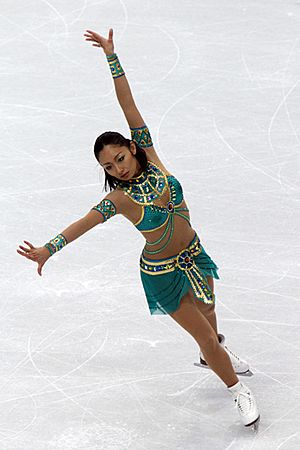
Programs After 2014
| Season | Free skating Pro-am events |
Exhibition |
|---|---|---|
| 2014–16 |
Programs Before 2014
| Season | Short program | Free skating | Exhibition |
|---|---|---|---|
| 2013–14 |
|
||
| 2012–13 | Did not compete this season | ||
| 2011–12 | Did not compete this season |
|
|
| 2010–11 |
|
|
|
| 2009–10 |
|
|
|
| 2008–09 |
|
|
|
| 2007–08 |
|
|
|
| 2006–07 |
|
|
|
| 2005–06 |
|
|
|
| 2004–05 |
|
|
|
| 2003–04 |
|
|
|
| 2002–03 |
|
|
|
| 2001–02 |
|
||
| 2000–01 |
|
|
|
Miki Ando's Competition Results
GP: Grand Prix; JGP: Junior Grand Prix
| International Competitions | ||||||||||||||
|---|---|---|---|---|---|---|---|---|---|---|---|---|---|---|
| Event | 99–00 | 00–01 | 01–02 | 02–03 | 03–04 | 04–05 | 05–06 | 06–07 | 07–08 | 08–09 | 09–10 | 10–11 | 11–12 | 13–14 |
| Olympics | 15th | 5th | ||||||||||||
| Worlds | 4th | 6th | 1st | WD | 3rd | 4th | 1st | |||||||
| Four Continents | 3rd | 1st | ||||||||||||
| GP Final | 4th | 4th | 5th | 6th | 2nd | 5th | ||||||||
| GP Bompard | 2nd | |||||||||||||
| GP Cup of China | 4th | 2nd | 1st | |||||||||||
| GP Cup of Russia | 2nd | 1st | 1st | |||||||||||
| GP NHK Trophy | 2nd | 4th | 4th | 1st | ||||||||||
| GP Skate America | 3rd | 1st | 2nd | 3rd | ||||||||||
| Golden Spin | 2nd | |||||||||||||
| Ice Challenge | 2nd | |||||||||||||
| Nebelhorn Trophy | 2nd | |||||||||||||
| International: Junior Competitions | ||||||||||||||
| Junior Worlds | 3rd | 2nd | 1st | |||||||||||
| JGP Final | 1st | 3rd | 1st | |||||||||||
| JGP Canada | 1st | |||||||||||||
| JGP China | 1st | |||||||||||||
| JGP Czech Rep. | 1st | |||||||||||||
| JGP Japan | 1st | |||||||||||||
| JGP Mexico | 1st | |||||||||||||
| JGP Sweden | 1st | |||||||||||||
| National Competitions | ||||||||||||||
| Japan Champ. | 3rd | 5th | 1st | 1st | 6th | 2nd | 2nd | 3rd | 4th | 1st | 7th | |||
| Japan Junior | 7th | 3rd | 1st | 1st | 1st | |||||||||
| Team Events | ||||||||||||||
| World Team Trophy |
3rd T 5th P |
|||||||||||||
| Japan Open | 1st T 4th P |
1st T 1st P |
1st T 2nd P |
3rd T 6th P |
||||||||||
| WD: Withdrew T: Team result; P: Personal result. Medals awarded for team result only. |
||||||||||||||
| Pro-am Events | ||
|---|---|---|
| Event | 2014–15 | 2015–16 |
| Medal Winners Open | 3rd | 3rd |
Detailed Competition Results
Small medals for short program and free skating are only given at ISU Championships.
| 2013–14 Season | ||||
|---|---|---|---|---|
| Date | Event | SP | FS | Total |
| December 20–23, 2013 | 2013–14 Japan Championships | 5 64.87 |
9 106.25 |
7 171.12 |
| December 5–8, 2013 | 2013 Golden Spin of Zagreb | 2 62.81 |
2 114.01 |
2 176.82 |
| November 19–24, 2013 | 2013 Ice Challenge | 1 56.78 |
2 94.12 |
2 150.90 |
| September 26–28, 2013 | 2013 Nebelhorn Trophy | 2 59.79 |
4 103.07 |
2 162.86 |
| 2011–12 Season | ||||
| Date | Event | SP | FS | Total |
| October 1, 2011 | 2011 Japan Open | – | 6 88.11 |
3T |
| 2010–11 Season | ||||
| Date | Event | SP | FS | Total |
| April 25 – May 1, 2011 | 2011 World Championships | 2 65.58 |
1 130.21 |
1 195.79 |
| February 15–20, 2011 | 2011 Four Continents Championships | 1 66.58 |
1 134.76 |
1 201.34 |
| December 24–26, 2010 | 2010–11 Japan Championships | 2 64.76 |
1 137.58 |
1 202.34 |
| December 8–12, 2010 | 2010–11 Grand Prix Final | 5 50.45 |
1 122.70 |
5 173.15 |
| November 19–21, 2010 | 2010 Rostelecom Cup | 5 54.00 |
1 120.47 |
1 174.47 |
| November 5–7, 2010 | 2010 Cup of China | 3 56.11 |
1 116.10 |
1 172.21 |
| October 2, 2010 | 2010 Japan Open | – | 2 115.02 |
1T |
| 2009–10 Season | ||||
| Date | Event | SP | FS | Total |
| March 22–28, 2010 | 2010 World Championships | 11 55.78 |
3 122.04 |
4 177.82 |
| February 14–27, 2010 | 2010 Winter Olympic Games | 4 64.76 |
6 124.10 |
5 188.86 |
| December 25–27, 2009 | 2009–10 Japan Championships | 3 68.68 |
4 116.76 |
4 185.44 |
| December 2–6, 2009 | 2009–10 Grand Prix Final | 1 66.20 |
2 119.74 |
2 185.94 |
| November 2–5, 2009 | 2009 NHK Trophy | 2 56.22 |
2 106.33 |
1 162.55 |
| October 22–25, 2009 | 2009 Rostelecom Cup | 3 57.18 |
1 114.75 |
1 171.93 |
| 2008–09 Season | ||||
| Date | Event | SP | FS | Total |
| April 15–19, 2009 | 2009 ISU World Team Trophy | 3 62.08 |
6 105.44 |
3T/5P 167.52 |
| March 23–29, 2009 | 2009 World Championships | 4 64.12 |
2 126.26 |
3 190.38 |
| December 25–27, 2008 | 2008–09 Japan Championships | 3 65.02 |
4 109.07 |
3 174.09 |
| December 10–14, 2008 | 2008–09 Grand Prix Final | 5 55.44 |
5 102.81 |
6 158.25 |
| November 5–9, 2008 | 2008 Cup of China | 2 59.30 |
2 111.58 |
2 170.88 |
| October 23–26, 2008 | 2008 Skate America | 2 57.80 |
3 110.62 |
3 168.42 |
| 2007–08 Season | ||||
| Date | Event | SP | FS | Total |
| March 17–23, 2008 | 2008 World Championships | 8 59.21 |
WD | – |
| February 11–17, 2008 | 2008 Four Continents Championships | 2 60.07 |
3 117.59 |
3 177.66 |
| December 26–28, 2007 | 2007–08 Japan Championships | 2 68.68 |
1 135.50 |
2 204.18 |
| November 29 – December 2, 2007 | 2007 NHK Trophy | 2 60.52 |
7 85.29 |
4 145.81 |
| October 25–28, 2007 | 2007 Skate America | 2 56.58 |
1 105.31 |
2 161.89 |
| 2006–07 Season | ||||
| Date | Event | SP | FS | Total |
| April 29, 2007 | 2007 Japan Open | – | 1 112.65 |
1T |
| March 19–25, 2007 | 2007 World Championships | 2 67.98 |
2 127.11 |
1 195.09 |
| December 27–29, 2006 | 2006–07 Japan Championships | 2 69.50 |
3 116.15 |
2 185.65 |
| December 14–17, 2006 | 2006–07 Grand Prix Final | 2 67.52 |
6 89.80 |
5 157.32 |
| November 17–19, 2006 | 2006 Trophée Eric Bompard | 2 65.02 |
2 109.42 |
2 174.44 |
| October 26–29, 2006 | 2006 Skate America | 2 66.74 |
1 125.85 |
1 192.59 |
| 2005–06 Season | ||||
| Date | Event | SP | FS | Total |
| March 14, 2006 | 2006 Japan Open | – | 4 104.56 |
1T |
| February 10–26, 2006 | 2006 Winter Olympics | 8 56.00 |
16 84.20 |
15 140.20 |
| December 23–25, 2005 | 2005–06 Japan Championships | 6 60.24 |
6 113.12 |
6 173.36 |
| December 16–18, 2005 | 2005–06 Grand Prix Final | 3 56.70 |
4 100.60 |
4 157.30 |
| December 1–3, 2005 | 2005 NHK Trophy | 4 54.56 |
4 99.78 |
4 154.34 |
| November 24–27, 2005 | 2005 Cup of Russia | 2 60.76 |
2 111.54 |
2 172.30 |
| 2004–05 Season | |||||
|---|---|---|---|---|---|
| Date | Event | QR | SP | FS | Total |
| March 14–20, 2005 | 2005 World Championships | 2 27.66 |
7 59.30 |
7 106.18 |
6 193.14 |
| December 24–26, 2004 | 2004–05 Japan Championships | – | 3 63.23 |
1 109.24 |
1 172.47 |
| December 16–19, 2004 | 2004–05 Grand Prix Final | – | 5 51.06 |
3 100.04 |
4 151.10 |
| November 11–14, 2004 | 2004 Cup of China | – | 4 49.76 |
4 100.56 |
4 150.32 |
| November 4–7, 2004 | 2004 NHK Trophy | – | 3 50.90 |
1 119.46 |
2 170.36 |
| October 21–24, 2004 | 2004 Skate America | – | 1 53.64 |
6 89.00 |
3 142.64 |
| 2003–04 Season | ||||||
|---|---|---|---|---|---|---|
| Date | Event | Level | QR | SP | FS | Total |
| March 22–28, 2004 | 2004 World Championships | Senior | 2 | 3 | 4 | 4 |
| March 1–6, 2004 | 2004 World Junior Championships | Junior | 1 | 1 | 1 | 1 |
| December 25–26, 2003 | 2003–04 Japan Championships | Senior | – | 2 | 1 | 1 |
| December 12–14, 2003 | 2003–04 JGP Final | Junior | – | 2 | 1 | 1 |
| November 22–23, 2003 | 2003–04 Japan Junior Championships | Junior | – | 1 | 1 | 1 |
| October 16–19, 2003 | 2003 JGP Mexico | Junior | – | 1 | 1 | 1 |
| September 25–26, 2003 | 2003 JGP Japan | Junior | – | 1 | 1 | 1 |
| 2002–03 Season | ||||||
| Date | Event | Level | QR | SP | FS | Total |
| Feb. 24 – March 2, 2003 | 2003 World Junior Championships | Junior | 3 | 3 | 2 | 2 |
| December 20–22, 2002 | 2002–03 Japan Championships | Senior | – | 2 | 6 | 5 |
| December 12–15, 2002 | 2002–03 JGP Final | Junior | – | 5 | 2 | 3 |
| November 23–24, 2002 | 2002–03 Japan Junior Championships | Junior | – | 1 | 1 | 1 |
| October 17–20, 2002 | 2002 JGP China | Junior | – | 2 | 1 | 1 |
| September 26–29, 2002 | 2002 JGP Canada | Junior | – | 3 | 1 | 1 |
| 2001–02 Season | ||||||
| Date | Event | Level | QR | SP | FS | Total |
| March 4–10, 2002 | 2002 World Junior Championships | Junior | 1 | 4 | 3 | 3 |
| December 21–23, 2001 | 2001–02 Japan Championships | Senior | – | 3 | 3 | 3 |
| December 13–16, 2001 | 2001–02 JGP Final | Junior | – | 2 | 1 | 1 |
| November 23–24, 2001 | 2001–02 Japan Junior Championships | Junior | – | 1 | 1 | 1 |
| November 1–4, 2001 | 2001 JGP Sweden | Junior | – | 1 | 1 | 1 |
| September 27–30, 2001 | 2001 JGP Czech Republic | Junior | – | 3 | 1 | 1 |
- QR: Qualification round
See also
 In Spanish: Miki Andō para niños
In Spanish: Miki Andō para niños
 | Misty Copeland |
 | Raven Wilkinson |
 | Debra Austin |
 | Aesha Ash |


